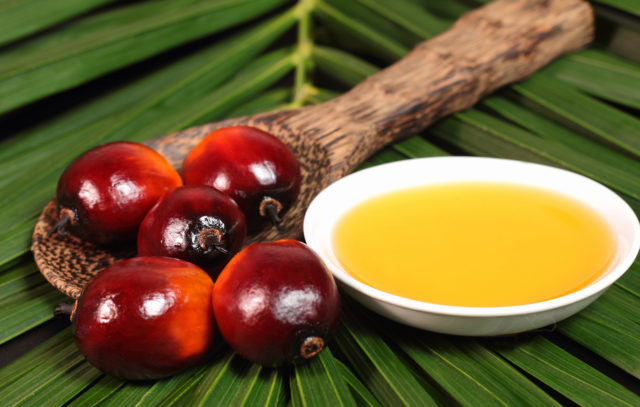- Home
- Our Products – Grid Layout
- Palm Oil
Palm Oil
Palm oil (also known as dendê oil, from Portuguese) is an edible vegetable oil derived from the mesocarp (reddish pulp) of the fruit of the oil palms, primarily the African oil palm Elaeis guineensis, and to a lesser extent from the American oil palm Elaeis oleifera and the maripa palm Attalea maripa.
Palm oil is naturally reddish in color because of a high beta-carotene content. It is not to be confused with palm kernel oil derived from the kernel of the same fruit, or coconut oil derived from the kernel of the coconut palm (Cocos nucifera). The differences are in color (raw palm kernel oil lacks carotenoids and is not red), and in saturated fat content: palm mesocarp oil is 41% saturated, while palm kernel oil and coconut oil are 81% and 86% saturated fats, respectively.
Along with coconut oil, palm oil is one of the few highly saturated vegetable fats and is semi-solid at room temperature.
Palm oil is a common cooking ingredient in the tropical belt of Africa, Southeast Asia and parts of Brazil. Its use in the commercial food industry in other parts of the world is widespread because of its lower cost and the high oxidative stability (saturation) of the refined product when used for frying.
The use of palm oil in food products has attracted the concern of environmental activist groups; the high oil yield of the trees has encouraged wider cultivation, leading to the clearing of forests in parts of Indonesia and Malaysia in order to make space for oil-palm monoculture. This has resulted in significant acreage losses of the natural habitat of the orangutan, of which both species are endangered; one species in particular, the Sumatran orangutan, has been listed as critically endangered. In 2004, an industry group called the Roundtable on Sustainable Palm Oil (RSPO) was formed to work with the palm oil industry to address these concerns. Additionally, in 1992, in response to concerns about deforestation, the Government of Malaysia pledged to limit the expansion of palm oil plantations by retaining a minimum of half the nation’s land as forest cover.

